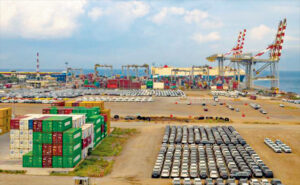
Leading the charge in port sustainability
As hubs of transportation for many businesses and individuals, ports play a critical role of connecting local and worldwide markets. Maintaining optimal speed and efficiency in a port’s operations is crucial. However, port activities are also found to be big contributors in producing carbon emissions — from marine traffic, cargo handling, and transportation facilities — which bring much impact on the environment.
By shifting to sustainability, the port industry is doing a significant share in helping address climate change and also uplifting the health of the people served by ports, while also maintaining efficiency in port activities.
Currently, the Philippine Ports Authority (PPA), a government agency under the Department of Transportation (DoTr) that is responsible for all port activities in the country, is leading the shift to sustainable change in the port industry by developing initiatives that center on environmental conservation and mitigating the effects of climate change.
The PPA has given top priority to its green port programs to ensure cleaner ports and oceans. According to the agency’s annual report, this program, based on APEC Port Services Network (APSN) Green Port Awards System (GPAS), aims to decrease greenhouse gas emissions, mitigate climate risks, and promote sustainable development in the sector. According to the PPA, this initiative contributes to efforts raising environmental awareness and the organization’s green port development strategies.
As a result, many of the Philippine ports received the GPAS in recent years in recognition of their continuous sustainable port operations. Among them are PMO Surigao, Manila International Container Terminal (MICT), Manila South Harbor, Port of Cagayan De Oro, and Port of Batangas.
Aligned with the agency’s vision to reduce ocean pollution, the PPA entered a partnership with the World Wide Fund for Nature Philippines (WWF-Philippines) in 2021, which is led by the PPA Port Management Office of Batangas, which manages the second-largest seaport in the country.
This partnership, also known as the “Clean Ports, Clean Ocean Project,” aims to reduce plastic waste leakage by 50% across several major ports in the country and create cleaner, plastic-free oceans. As part of this initiative, the PPA implemented several initiatives, including prohibiting single-use plastics in all port premises in the country.
“Through stringent measures such as the prohibition of single-use plastics and innovative strategies like weekly plastic collection events led by local social enterprises, the Port of Batangas is not only effecting tangible change but also fostering a culture of environmental stewardship,” the report said.
In addition, PPA-managed ports harnessed literacy to increase environmental awareness through education and information materials that inform about proper waste management practices in port facilities.
Photo from the PPA 2023 Annual Report
The agency has also installed trash bins inside passenger terminal buildings. The WWF-Philippines has donated trash bins, made from eco boards, to be used to improve waste management practices at PPA ports nationwide. In 2023, the group has given these trash bins to the PMO Batangas, and four waste bins and communication materials, in partnership with the Manila North Harbor Port, Inc. (MNHPI) and the Greg Foundation.
Taking the green initiative a step further, the partnership between the PPA and WWF-Philippines brought forth a recycling program called “Trash-to-Cashback,” which is designed to practice recycling and proper waste management. Under this program, recyclable materials collected are converted to environmental points. These points, worth a peso each, can be redeemed with the agency’s partners (e.g., BDO, Lazada, Smart) and can be used for daily necessities such as utility bills, grocery items, food deliveries, and more. According to a recent statement, all personnel that used this program have garnered 169 kilograms of recyclable waste and collected 289.50 environmental points.
Another notable initiative noted by the agency in its report are waste reception facilities and material recover facilities, which are crucial to prevent ships from dumping waste in the ocean. Because many port operations are responsible for water pollution, waste-receiving facilities in ports are necessary for proper waste management and, in turn, mitigating water pollution. For this, the PPA has actively engaged with the International Maritime Organization (IMO) agenda, which established the initiative titled “International Convention for the Prevention of Pollution from Ships,” also known as MARPOL 73/78 Convention. As of 2023, the agency has already complied with this initiative, and 84% (24 out of 25) of PMOs are working closely with the Port Reception Facilities (PRF) provider.
Aside from these initiatives, through collaborative efforts, tree-planting projects were developed, aiming to mitigate urban heat as well as the impacts of climate change. An example of this is the planting of trees during the first-ever urban edition of Pista Y Ang Kagueban (Feast of the Forest) in Puerto Princesa City, made possible by the Palawan PMO in collaboration with stakeholders. With strong commitment to environmental protection and community engagement, 8,000 trees have been planted across various ports as of 2023.
Clean-up initiatives were also held in promotion of marine conservation and protection ecosystems. Clean-up campaigns were recently held for the Banago Port in Bacolod City and Gingoog Pier in Misamis Oriental.
“Through proactive environmental initiatives, community engagement, and a commitment to service, the PPA steers a course toward sustainability,” the PPA’s report read. — Angela Kiara S. Brillantes



